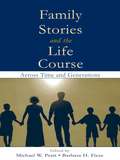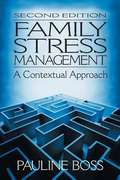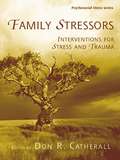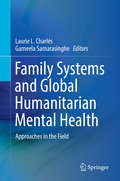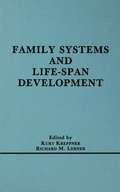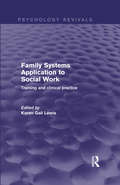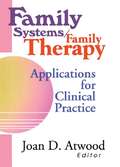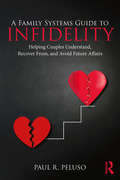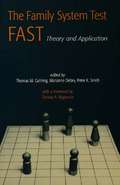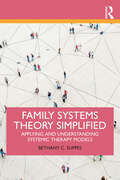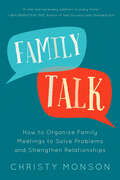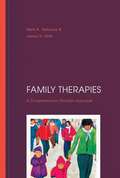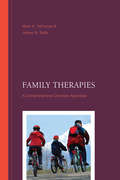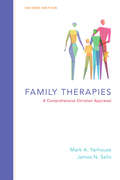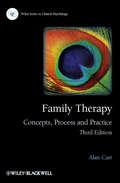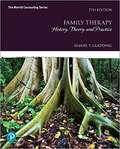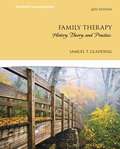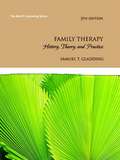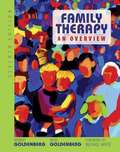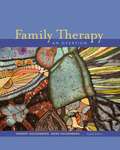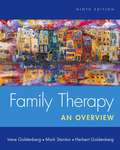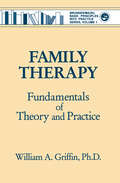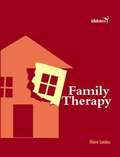- Table View
- List View
Family Stories and the Life Course: Across Time and Generations
by Michael W. Pratt Barbara H. FieseThis edited book draws from work that focuses on the act of telling family stories, as well as their content and structure. The process of telling family stories is linked to central aspects of development, including language acquisition, affect regulation, and family interaction patterns. This book extends across traditional developmental psychology, personality theory, and family studies. Drawing broadly on the epigenetic framework for individual development articulated by Erik Erikson, as well as on conceptions of the family life cycle, the editors bring together contemporary examples of psychological research on family stories and their implications for development and change at different points in the life course. The book is divided into sections that focus on family stories at different points in the life cycle, from early childhood and the beginnings of narrative skill, through adolescence, young adulthood, midlife, and then mature adulthood and its intergenerational meaning. During each of these periods of the life cycle, research focusing on individual development within an Eriksonian framework of ego strengths and virtues is highlighted. The dynamic role of family stories is also featured here, with work exploring the links between family process, intergenerational attachment, and storytelling. Sociocultural theories that emphasize how such development is situated in the wider cultural context are also featured in several chapters. This broad lifespan developmental focus serves to integrate the exciting diversity of this work and foster further questions and research in the emerging field of family narrative. The book is intended primarily for researchers and advanced-level students in the fields of developmental and personality psychology, as well as those in family studies and in gerontology. It may also be of interest to those in the helping professions who are concerned with family therapy and family issues, and may--due to its content and illustrative material--have appeal to a wider market of the lay public. The chapters are written in a readily accessible style and the analyses are presented in a fairly non-technical way. Because family stories are charted across the lifespan, it would be a suitable companion book to a more traditional lifespan textbook in certain courses.
Family Stress Management: A Contextual Approach (Second Edition)
by Pauline BossIn this Second Edition, the author continues to explore both the larger context surrounding families and stress and the inner context, which includes perceptions and meanings. The author emphasizes the need for a more general contextual model of family stress and crises than other models. The goal is to provide a framework for students and professionals engaged in helping families learn how to manage their stress.
Family Stressors: Interventions for Stress and Trauma (Psychosocial Stress Series #No. 29)
by Don CatherallFamily Stressors: Interventions for Stress and Trauma by Don Catherall
Family Systems and Global Humanitarian Mental Health: Approaches in the Field
by Laurie L. Charlés Gameela SamarasingheThis powerful reference explores the processes and practices of family systems therapy as conducted in humanitarian situations across the globe. It follows the editors’ previous volume Family Therapy in Global Humanitarian Contexts: Voices and Issues from the Field in defining systemic therapy as multidisciplinary, portable, and universal, regardless of how far from traditional clinical settings it is applied. Chapters from diverse locales document remarkable examples of courage and resilience on the part of therapists as well as clients in the face of war, unjust policies, extreme inequities, and natural disasters. Contributors describe choosing and implementing interventions to fit both complex immediate challenges and their local contexts as they work to provide systemic family and public mental health services, including:Assisting families of missing persons in CyprusEmergency counseling after a Florida school shooting Therapeutic metaphors in a Lebanese refugee campSessions with separated family members on the U.S./Mexico borderAddressing healthcare disparities in the CaribbeanTraining family therapists in Sri LankaFamily and community support during the Ebola epidemic in GuineaProviding systemically oriented therapy and supervision in high-conflict countriesRisk assessment using emerging media in Chilean communitiesFamily Systems and Global Humanitarian Mental Health: Approaches in the Field is a valuable resource for professionals in both the global North and South, including family therapists, psychologists, psychiatrists, nurses and public health professionals, and mental health and psychosocial support providers working in humanitarian settings.
Family Systems and Life-span Development
by Richard M. Lerner Kurt KreppnerThis interdisciplinary volume presents international research and theories focusing on the development of the individual across the life span. Centering on "family" as the key context influencing, and being influenced by the developing person, the contributors to this volume discuss an array of theoretical models, methodological strategies, and substantive foci linking the study of individual development, the family system, and the broader context of human development. The volume presents continuing empirical research and theories in the realm of individual and family development and features a developmental, contextual view from a process-oriented vantage point.
Family Systems Application to Social Work: Training and Clinical Practice (Psychology Revivals)
by Karen Gail LewisOriginally published in 1991, this title is a valuable social work text which demonstrated how to apply family system concepts to clinical situations encountered in work with inner-city populations at the time. Unlike traditional theories in clinical social work which were oriented toward the individual, this fascinating book offers a paradigm for social work that encompasses the client, his or her immediate and extended family, the community, the government, and the social worker. The family systems concepts in this refreshing volume are illustrated by case examples addressing the specific issues of AIDS and drug abuse, homelessness, foster care, wife abuse, care of those with intellectual disabilities, and adoption issues. Social workers and social work students can still gain perspective from these insightful chapters and will discover that it is not pathological people that make difficult populations, but difficult life situations that breed pathology.
Family Systems/Family Therapy: Applications for Clinical Practice
by Joan D AtwoodUse your family therapy skills to coordinate multidisciplinary teams!This comprehensive book examines family therapy issues in the context of the larger systems of health, law, and education. Family Systems/Family Therapy shows how family therapists can bring their skills to bear on a broad range of problems, both by considering the effects of larger social systems and by cooperating with professionals in other disciplines. Because family therapists are trained to understand how systems operate, they can offer wise guidance whether the dysfunction is occurring within the family system or between the individual and the larger systems of society. The studies and projects reported in Family Systems/Family Therapy demonstrate the ways in which family therapists can help create dialogues of inclusion to develop innovative, effective solution plans. The PEACE project, for example, brings together judges, attorneys, divorcing parents, and therapists to help children deal with the strains of divorce. Family Systems/Family Therapy includes both practical case histories and theoretical considerations. This thought-provoking book suggests areas in which an intersystems approach can be especially effective, including: preventing substance abuse in adolescent girls enhancing awareness of adolescent dating violence managing geriatric care, not just for the identified patient, but for the family as a whole doing court-ordered therapy for divorcing couples working with children labeled as difficult and their teachersFamily Systems/Family Therapy will give family therapists a new vision of what they can achieve when working in the context of individuals, families, or the broader system.
A Family Systems Guide to Infidelity: Helping Couples Understand, Recover From, and Avoid Future Affairs (Family Systems Counseling: Innovations Then and Now)
by Paul R. PelusoA Family Systems Guide to Infidelity offers an explanatory model and concrete techniques, enabling therapists and counselors to treat the core of a couple’s relationship problems instead of merely applying a therapeutic bandage. Chapters give therapists proven techniques to help couples redevelop trust, rebalance power, increase satisfaction, and recover from the wounds that infidelity causes. This text uses case studies from clinical practice, examples of public or historical figures, and scenarios from popular movies to illustrate concepts, and it provides a systemic explanatory model for understanding infidelity, one that focuses on marital dissatisfaction, power imbalances, unfulfilled dreams, and the discovery of infidelity.
The Family Systems Test (FAST): Theory and Application
by Thomas M. Gehring Marianne Debry Peter K. SmithThe Family System Test (FAST), developed by Thomas M. Gehring, is an important new tool for investigating family relations. Based on the structural-systemic theory of families, it is a figural technique for representing emotional bonds (cohesion) and hierarchical structures in the family or similar social systems. In this unique volume, the editors draw on current theory and research in family or similar social systems together with a variety of empirical studies that have used the FAST, to provide a comprehensive overview and assessment of the test and its use in various clinical research contexts.The book is divided into four sections, each focusing on a different aspect of the FAST. Part 1 describes the concepts and psychometric properties of the FAST within the context of theoretically and empirically relevant aspects of the field of family psychology as a whole. Special emphasis is given to systematic-structural approaches to assessing individual and family functioning. Part II focuses on the use of the FAST in developmental research. For example, the the FAST has been used to show how family constructs are influenced by age, type of family and situation. Part III deals with cross-cultural issues and compares the interpersonal constructs of Japanese and Chinese families to Western families. Finally, Part IV addresses the applications of the FAST in clinical setting - in diagnosis of biopsychosocial problems and planning and evaluation of clinical interventions.The result is a book that helps to bridge the gap between theory, practice and research. It will be essential reading for users of the FAST and all clinicians and researchers who work in family relations and development.
Family Systems Theory Simplified: Applying and Understanding Systemic Therapy Models
by Bethany C. SuppesIn this textbook for students and instructors of marriage and family therapy, Bethany C. Suppes offers a refreshed perspective of family systems therapy (FST), focusing on the importance of understanding its concepts and demonstrating how models of marriage and family therapy can appear practically in counseling. In Part I, Suppes begins with a theoretical overview of FST, including the history of development, key theorists, and defining core concepts. In Part II, she focuses on application and explores nine key components of FST, identifying how various systemic therapy models apply these concepts. The book also covers the professional responsibilities of the systemic therapist and cultural considerations for those using the theory professionally. Primarily written for those having their first exposure to the ideas of FST, it explains concepts in a language and structure that is more comprehensive and culturally aware than existing literature, aiming to improve the therapeutic process for both therapist and client.
Family Talk: How to Organize Family Meetings to Solve Problems and Strengthen Relationships
by Christy MonsonChristy Monson, a retired family therapist, provides in simple language concrete examples and clear language to family success through family councils. While families are diverse and their needs are unique, a family council provides a safe and strong environment for every family to discuss issues and explore the best ways to have the family succeed. A family council is not just any meeting. It's a special event that provides a background and foundation to create healthy family synergy. Monson teaches families what a family council is and what it is not, why it’s a perfect environment for teaching, for exploring difficult issues, learning how to play, and how best to solve problems at home, school, or work. Monson also includes information for families with special needs. Family councils are a great way to bring children and parents together in a positive environment where they can discuss and solve problems
Family Therapies: A Comprehensive Christian Appraisal
by Mark A. Yarhouse James N. SellsChristian therapists doing family therapy have never had a resource to help them navigate the various family therapy theories from a Christian perspective--until now. In this book Mark A. Yarhouse and James N. Sells survey the major approaches to family therapy and treat, within a Christian framework, significant psychotherapeutic issues. The wide array of issues covered includescrisis and traumamarital conflictseparation, divorce and blended familiesindividual psychopathologysubstance abuse and addictionsgender, culture, economic class and racesexual identityCalling for an integrated approach of "responsible eclecticism," they conclude with a vision for Christian family therapy. A landmark work providing critical Christian engagement with existing models of family therapy, this volume was written for those studying counseling, social work, psychology or family therapy. Family Therapies will also serve as an indispensable resource for those in the mental health professions, including counselors, psychologists, family therapists, social workers and pastors.
Family Therapies: A Comprehensive Christian Appraisal (CAPS #5)
by Mark A. Yarhouse James N. SellsChristian therapists doing family therapy have never had a resource to help them navigate the various family therapy theories from a Christian perspective--until now. In this book Mark A. Yarhouse and James N. Sells survey the major approaches to family therapy and treat, within a Christian framework, significant psychotherapeutic issues. The wide array of issues covered includes • crisis and trauma • marital conflict • separation, divorce and blended families • individual psychopathology • substance abuse and addictions • gender, culture, economic class and race • sexual identity Calling for an integrated approach of "responsible eclecticism," they conclude with a vision for Christian family therapy. A landmark work providing critical Christian engagement with existing models of family therapy, this volume was written for those studying counseling, social work, psychology or family therapy. Family Therapies will also serve as an indispensable resource for those in the mental health professions, including counselors, psychologists, family therapists, social workers and pastors.
Family Therapies: A Comprehensive Christian Appraisal (Christian Association for Psychological Studies Books #5)
by Mark A. Yarhouse James N. Sellscrisis and traumamarital conflictseparation, divorce, and blended familiessubstance abuse and addictionsgender, culture, economic class, and racesexual identity
Family Therapy
by Alan CarrNow in its third edition, this highly regarded and well-established textbook includes up-to-date coverage of recent advances in family therapy practice and reviews of latest research, whilst retaining the popular structure and chapter features of previous editions. Presents a unique, integrative approach to the theory and practice of family therapyDistinctive style addresses family behaviour patterns, family belief systems and narratives, and broader contextual factors in problem formation and resolutionShows how the model can be applied to address issues of childhood and adolescence (e.g. conduct problems, drug abuse) and of adulthood (e.g. marital distress, anxiety, depression)Student-friendly features: chapters begin with a chapter plan and conclude with a summary of key points; theoretical chapters include a glossary of new terms; case studies and further reading suggestions are included throughout
Family Therapy: History, Theory, and Practice
by Samuel GladdingFamily Therapy: History, Theory, and Practice covers all aspects of working with couples and families. Grounded in evidence-based practice and the rich theoretical background of marriage and family therapy, the text presents important background information on healthy functioning families of all different compositions, includes an overview of how individual and family life cycles intertwine, and concretely and clearly illustrates (with a wealth of examples) the evidence-based interventions used in working with families that need counseling. <p><p> Thoroughly updated with over 240 new citations, the 7th Edition has added separate chapters on Psychodynamic Family Theories, Bowen Family Systems Theory, Solution-Focused Brief Therapy, and Narrative Family Therapy.
Family Therapy: History, Theory, and Practice
by Samuel T. GladdingConsidered the most thorough, well-written book in the field, Samuel T. Gladding's, Family Therapy: History, Theory, and Practice, give readers clear coverage of all aspects of working with couples and families from proven, evidence-based theories. In a user-friendly organization and writing style, it covers important background information on healthy and functional families and different types of families, and includes an overview of how individual and family life cycles intertwine. The basic processes involved in treating couples and families are made clear, before delving into a dozen theoretical ways of treating families.
Family Therapy: History, Theory, and Practice
by Samuel T. GladdingThe most thorough and well-written text in the field, Family Therapy: History, Theory, and Practice, covers all aspects of working with families. Beginning with an explanation of how individual and family life cycles differ and how healthy and dysfunctional families operate regardless of structure or ethnicity, the author clearly covers the basic processes involved in treating couples and families before delving into a dozen theoretical ways of treating families. Readers will learn about the history of family therapy, multicultural aspects of family therapy, ways of working with various types of families, ethical and legal issues involved in family therapy, and ways of assessing families. Thoroughly updated and revised, the fifth edition is logically organized into three sections-Understanding Families and Family Dynamics, Therapeutic Approaches to Working with Families, and Professional and Clinical Issues in Family Therapy. Each chapter has an abundance of examples and case studies, and discussion questions included at the end of each chapter help to engage class participation.
Family Therapy: An Overview (7th edition)
by Herbert Goldenberg Irene GoldenbergFirst published in 1980, this updated textbook--now in its seventh edition--provides an overview of the major theoretical underpinnings of family therapy and describes current clinical practices. Clinical cases illustrate the application of a particular set of techniques for each of the established schools of family therapy. Newer models, such as the social constructionist views, are also discussed. The volume concludes with a comparative overview of family theories and therapies.
Family Therapy: An Overview (Eighth Edition)
by Herbert Goldenberg Irene GoldenbergFAMILY THERAPY provides a balanced presentation of the major theoretical underpinnings and clinical practices in the field. By presenting an overview of traditional and evolving viewpoints, perspectives, values, intervention techniques, and goals of family therapy, Herbert and Irene Goldenberg provide current, relevant, practice-oriented content laying the foundation for students to become proficient family therapists. This edition reflects the Goldenbergs' commitment to providing students with not only traditional family therapy theoretical frameworks but also the field's evolving models of practice. It is the complete resource for assisting students in mastering the many facets of family therapy. For this edition, Michael White, founder of Narrative Therapy, has written a new foreword for the book.
Family Therapy: An Overview Ninth Edition
by Herbert Goldenberg Irene Goldenberg Mark StantonCompletely up-to-date, this engaging and practice-oriented text is your complete resource to help students master the many facets of family therapy. In this ninth edition, the authors provide practice-oriented content in a more concise format that will help students become empathic and effective family therapists. New material focuses on how students can practice systemic thinking and on how to develop core competencies in family therapy. There is also increased attention to LGBTQ families and alternative forms of family life, and to gender, culture, and ethnic considerations. Color-coded boxes highlight key aspects of family therapy, such as family diversity, evidence-based practice research, "Thinking Like a Clinician" student exercises, case studies, clinical notes, and therapeutic encounters.
Family Therapy: Fundamentals Of Theory And Practice
by William A. GriffinFirst published in 1993. Routledge is an imprint of Taylor & Francis, an informa company.
Family Therapy
by Elaine LandauMany Americans judge their families by the highest of standards. We expect a problem-free family, featuring a happily married couple and two well-adjusted children. In reality, most families don't reflect our ideals, and many are faced with conflicts such as divorce, abuse, and communication issues. Find out how family therapy has helped real family members to identify their problems and voice their opinions. With the help of a family therapist, every family can successfully grow -- and change -- together.
Family Therapy: A Constructive Framework
by Dr Roger Lowe`I liked this book. Though I am not a family therapist, like most mental health nurses I try to bear in mind the family relationships of individuals I am working with. This is an enlightening text which not only offer a framework with which we can better understand the severe psychopathologies seen in forensic work, but also gives examples of how it may be used therapeutically' - Mental Health Practice `I think this is an important book that crystallises complex theory into a user-friendly model, using case material and discussions from the therapeutic community. A must have for counsellors working with families, this will form part of the recommended reading on the Family Counselling course' - Barbara McKay, Relate Head of Training, Relate News `The book provides a good overview of a number of recent approaches to working with families as well as how the author thinks about them' - Stephen Bray, Nurturing Potential `Roger Lowe achieves the almost impossible task of bringing together various theories, techniques and case examples in clear and accessible ways. Readers of all disciplines, from front-line hard-pressed practitioners to students on therapy and social work courses, will be grateful for the simple and, above all, useful way he tackles the burning questions that arise in working with the family group. Highly recommended!' - Harvey Ratner, Brief Therapy Practice, London Family Therapy introduces practitioners to the principles of using a constructive and collaborative approach with families. The approach builds on a strengths-based philosophy and focuses on enhancing family resilience and competence in a way that is both time-efficient and comprehensive. It brings together skills from contemporary models such as solution-focused, narrative and conversational therapies and adapts them to the specific challenges of working with family relationships. It is the first book to systematically integrate these influential approaches and apply them to family work. Setting out a clear framework for practice, Roger Lowe describes the key tasks for the therapist as: · hosting meetings · negotiating concerns, and · evoking family members' personal and relationship resources. The framework is designed to be clear but flexible, and to allow practitioners to adapt it to their own situational needs. For example, it suggests ways for practitioners to selectively 'borrow' from other therapeutic models while retaining a constructive orientation. It also explores ways in which therapists can use their 'inner' conversation during a session as a tool to overcome obstacles to the therapeutic process. Although there is a common belief that the approach is only suited to brief interventions, the author also describes ways of working constructively over a longer period of time. Throughout the book, case studies are included to show how the constructive framework is used in practice and to highlight a range of challenging situations that may be encountered during family therapy. Roger Lowe's book provides a refreshingly different approach to working with families, which chimes with the growing interest in constructive approaches. It is written for trainees and for practitioners who are interested in developing their skills in this collaborative and optimistic approach.
Family Therapy: Concepts and Methods
by Michael Nichols Sean DavisLong considered the standard of excellence--the best introduction and guide to the practice of family therapy available--this accessible resource explores the rich history and contemporary practice of the entire field. Thorough, thoughtful, fair, and balanced, Family Therapy by Michael P. Nichols presents ideas and techniques that give readers a clear focus on clinical practice. While exploring the history, the classic schools, and the latest developments, this new edition puts an increased, pragmatic focus on clinical practice, which includes discussions of the author's observations of actual sessions with leading practitioners, as well as the best case studies of several invited master therapists. Included are video links, interactive chapter quizzes, new case studies, a new section on the impact of the Affordable Care Act, and many more content changes that bring the reader up to date on the latest and most critical issues in the field of family therapy today. The Enhanced Pearson eText features embedded videos and assessments
